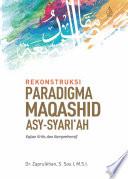
Rekonstruksi Paradigma Maqashid Asy-Syari'ah
Kajian Kritis dan Komprehensif
Dewasa ini, wajah pemikiran Islam global lebih banyak yang bersifat rigid, radikal, dan fundamentalistik. Bahkan, banyak dijumpai tindakan kriminal atau aksi terorisme yang diklaim oleh beberapa pelakunya atas nama "hukum Islam". Padahal, basis fundamental setiap hukum Islam adalah prinsip kebijaksanaan dan keselamatan umat manusia. Mirisnya lagi, aksi terorisme tersebut justru dilakukan di tengah-tengah masyarakat yang sedang menikmati kedamaian, ketenteraman, dan kemakmuran hidup. Salah satu problem fundamentalnya ialah wacana hukum Islam masih bercorak atomistik-parsialistik, baik dalam tataran metodologis maupun praktis. Aplikasi hukum Islam lebih bersifat reduksionis daripada holistik, literal daripada moral, satu dimensi daripada multidimensi, bercorak oposisi biner ketimbang multinilai, dekonstruksionis ketimbang rekonstruksionis, dan bersifat kausal ketimbang teleologis. Oleh karenanya, diperlukan pendekatan sistem yang bercorak multidisipliner terhadap teori-teori maqashid asy-syari'ah secara metodologis. Buku ini mengulas pendekatan sistem tersebut, yang diusung oleh Jasser Auda. la melakukan rekonstruksi paradigmatik baru dalam menganalisis hukum Islam. Berpijak pada sejumlah fitur sistem dalam membangun world view keislaman di era kontemporer. Maqosid yangdulutitiktekannya hanya pada pentingnya perlindungan terhadap umat Islam, bergeser menjadi perlindungan terhadap kemanusiaan-universal. Selamat membaca!
- ISBN 13 : 623669916X
- ISBN 10 : 9786236699164
- Judul : Rekonstruksi Paradigma Maqashid Asy-Syari'ah
- Sub Judul : Kajian Kritis dan Komprehensif
- Pengarang : Dr. Zaprulkhan, S.Sos.I., M.Si., S.Sos.I., M.Si., S.Sos.I., M.Si., S.Sos.I., M.Si., S.Sos.I., M.Si., S.Sos.I., M.Si., S.Sos.I., M.Si., S.Sos.I., M.Si.,
- Kategori : Religion
- Penerbit : IRCISOD
- Bahasa : id
- Tahun : 2020
- Halaman : 454
- Google Book : https://play.google.com/store/books/details?id=dqgJEAAAQBAJ&source=gbs_api
-
Ketersediaan :
... syariah Islam dengan politik . Namun , titik tekan pembahasan hubungan antara syariah dengan politik tersebut adalah fenomena setelah Arab ... Sharia and Politics : Questions for Rekonstruksi Paradigma Maqashid asy - Syari'ah 57.








